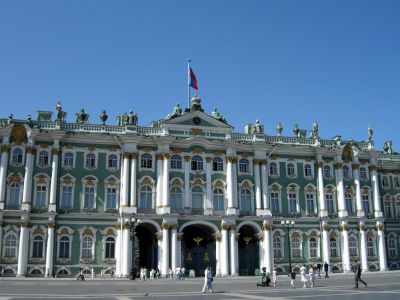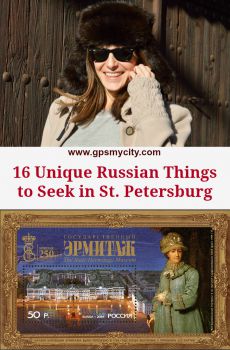Winter Palace and Hermitage Museum, St. Petersburg (must see)
The former residence of the Russian Royals from 1732 to 1917, the Winter Palace also served briefly as the seat of the Provisional Government between the two revolutions of February and October 1917.
As the government led by Alexander Kerensky eventually failed and was accused of wishing to "surrender Petrograd to the Germans”, a detachment of Red Guard soldiers and sailors stormed the building on 25 October 1917. The arrested ministers were taken to the Peter and Paul Fortress, while Kerensky himself managed to escape.
A historical reenactment of the palace storming organized by the Bolsheviks in 1920, featuring thousands of Red Guards led by Lenin, proved so impressive even to the leaders of the original event (which, ironically, took place via open back door guarded by the wounded and disabled reserves), that it was later depicted in the Soviet propaganda art as an iconic symbol of the Russian Revolution.
After the Bolsheviks moved the capital to Moscow, the palace became part of the Hermitage Museum complex. The State Hermitage is one of the oldest museums in the world. Founded in 1764 by Catherine the Great, it has been open to the public since 1852. The collection accounts for more than three million exhibits, of which only a small part is on permanent display (350 rooms!). The world's largest gathering of masterpieces by the likes of Leonardo da Vinci, Raphael, Rembrandt, Rubens, Goya, El Greco, Monet, Renoir, Matisse, Picasso, Van Gogh is what makes the Hermitage a prime attraction.
Why You Should Visit:
The Pride of St. Petersburg! A humbling experience even for avid museum goers.
Absolutely gorgeous against the backdrop of winter snow.
Tip:
You must buy a ticket to take video or photographs.
The entrance fee for foreigners is higher than for the locals. Free for all on the first Thursday of a month and daily for all students and children.
Make sure to arrive at the opening time of 10:30 to beat the crowds.
Book online on the official website and take a printed ticket with you, or get a general admission ticket from a ticket machine in the main courtyard.
The on-site café is crowded and overpriced, so have a hearty breakfast and bring a bottle of water.
A 3-hour guided tour visits all the must-sees. An audio-guide is vital if you are on your own.
As the government led by Alexander Kerensky eventually failed and was accused of wishing to "surrender Petrograd to the Germans”, a detachment of Red Guard soldiers and sailors stormed the building on 25 October 1917. The arrested ministers were taken to the Peter and Paul Fortress, while Kerensky himself managed to escape.
A historical reenactment of the palace storming organized by the Bolsheviks in 1920, featuring thousands of Red Guards led by Lenin, proved so impressive even to the leaders of the original event (which, ironically, took place via open back door guarded by the wounded and disabled reserves), that it was later depicted in the Soviet propaganda art as an iconic symbol of the Russian Revolution.
After the Bolsheviks moved the capital to Moscow, the palace became part of the Hermitage Museum complex. The State Hermitage is one of the oldest museums in the world. Founded in 1764 by Catherine the Great, it has been open to the public since 1852. The collection accounts for more than three million exhibits, of which only a small part is on permanent display (350 rooms!). The world's largest gathering of masterpieces by the likes of Leonardo da Vinci, Raphael, Rembrandt, Rubens, Goya, El Greco, Monet, Renoir, Matisse, Picasso, Van Gogh is what makes the Hermitage a prime attraction.
Why You Should Visit:
The Pride of St. Petersburg! A humbling experience even for avid museum goers.
Absolutely gorgeous against the backdrop of winter snow.
Tip:
You must buy a ticket to take video or photographs.
The entrance fee for foreigners is higher than for the locals. Free for all on the first Thursday of a month and daily for all students and children.
Make sure to arrive at the opening time of 10:30 to beat the crowds.
Book online on the official website and take a printed ticket with you, or get a general admission ticket from a ticket machine in the main courtyard.
The on-site café is crowded and overpriced, so have a hearty breakfast and bring a bottle of water.
A 3-hour guided tour visits all the must-sees. An audio-guide is vital if you are on your own.
Sight description based on Wikipedia.
Want to visit this sight? Check out these Self-Guided Walking Tours in St. Petersburg. Alternatively, you can download the mobile app "GPSmyCity: Walks in 1K+ Cities" from Apple App Store or Google Play Store. The app turns your mobile device to a personal tour guide and it works offline, so no data plan is needed when traveling abroad.
Winter Palace and Hermitage Museum on Map
Sight Name: Winter Palace and Hermitage Museum
Sight Location: St. Petersburg, Russia (See walking tours in St. Petersburg)
Sight Type: Attraction/Landmark
Guide(s) Containing This Sight:
Sight Location: St. Petersburg, Russia (See walking tours in St. Petersburg)
Sight Type: Attraction/Landmark
Guide(s) Containing This Sight:
Walking Tours in St. Petersburg, Russia
Create Your Own Walk in St. Petersburg
Creating your own self-guided walk in St. Petersburg is easy and fun. Choose the city attractions that you want to see and a walk route map will be created just for you. You can even set your hotel as the start point of the walk.
Russian Literary Heritage Walking Tour
If you're an ardent fan of Russian literature, St. Petersburg is undoubtedly your dream destination. Pushkin, Dostoevsky, Tolstoy, Gogol, Nabokov and many other Russia's literary greats have blessed this city with their presence – born, lived, worked, or set their characters here. To a great extent, St. Petersburg is a huge stone book, whose pages have been created by prominent Russian... view more
Tour Duration: 3 Hour(s)
Travel Distance: 5.9 Km or 3.7 Miles
Tour Duration: 3 Hour(s)
Travel Distance: 5.9 Km or 3.7 Miles
Bolshevik Revolution Walking Tour
When thinking of the events that changed the course of history in the 20th century, one of the first places that comes to mind is St. Petersburg. The “cradle of three revolutions” waged against the Tsarist autocracy saw the country's most important revolutionary events unravel, sending shock waves across the entire globe. What started in February 1917, reached its climax in October when... view more
Tour Duration: 4 Hour(s)
Travel Distance: 9.8 Km or 6.1 Miles
Tour Duration: 4 Hour(s)
Travel Distance: 9.8 Km or 6.1 Miles
Nevsky Prospekt Walking Tour
Nevsky Prospekt (Avenue) is the main artery of Saint Petersburg, named after the Alexander Nevsky Lavra (monastery) found at the eastern end of it. The monastery commemorates a prominent warlord and legendary figure in the Russian history, Prince Saint Alexander Nevsky (1221–1263).
Upon his founding of the city in 1703, Tsar Peter the Great planned the course of the street as the outset of... view more
Tour Duration: 3 Hour(s)
Travel Distance: 3.1 Km or 1.9 Miles
Upon his founding of the city in 1703, Tsar Peter the Great planned the course of the street as the outset of... view more
Tour Duration: 3 Hour(s)
Travel Distance: 3.1 Km or 1.9 Miles
Vasilyevsky Island Walking Tour
Situated just across the river from the Winter Palace, Vasilyevsky Island constitutes a large part of Saint Petersburg's historic center.
There are various versions of the origin of the island's name suggesting either Vasily-related etymology or perhaps just a corruption of the previous Swedish or Finnish name, e.g. Vasikkasaari (“Calf Island”). Legend has it, however, that some... view more
Tour Duration: 2 Hour(s)
Travel Distance: 2.7 Km or 1.7 Miles
There are various versions of the origin of the island's name suggesting either Vasily-related etymology or perhaps just a corruption of the previous Swedish or Finnish name, e.g. Vasikkasaari (“Calf Island”). Legend has it, however, that some... view more
Tour Duration: 2 Hour(s)
Travel Distance: 2.7 Km or 1.7 Miles
St. Petersburg Introduction Walking Tour
Russia's northern capital, Saint Petersburg is the country's second largest city where nearly every stone breathes history. It is named after apostle Saint Peter and traditionally dubbed by the Russians as “the Window to Europe” “opened” by Peter the Great on 27 May 1703 on the site of a captured Swedish fortress amid the swamp and the Neva River.
The city is integral with... view more
Tour Duration: 2 Hour(s)
Travel Distance: 4.3 Km or 2.7 Miles
The city is integral with... view more
Tour Duration: 2 Hour(s)
Travel Distance: 4.3 Km or 2.7 Miles
Useful Travel Guides for Planning Your Trip
16 Unique Russian Things to Seek in St. Petersburg
The "cradle of two revolutions", St. Petersburg bears cultural and historic significance for Russia that is hard to overestimate. Perhaps, nearly every stone in the downtown part of the city breathes history and can qualify as a memorable souvenir, although picking up them for such purpose...









